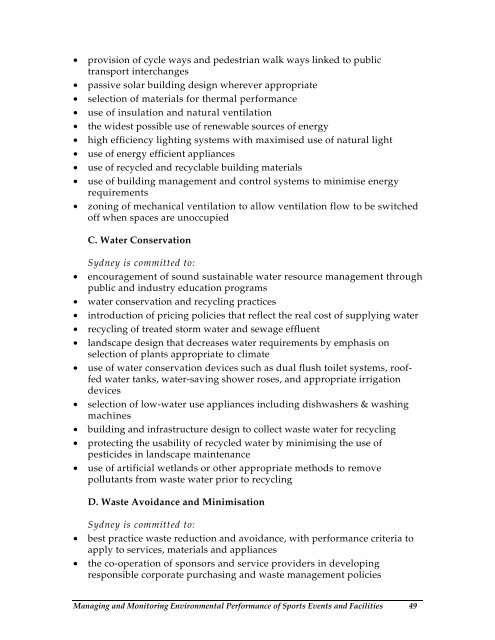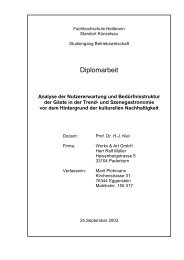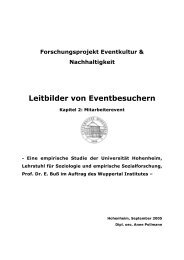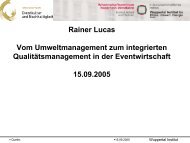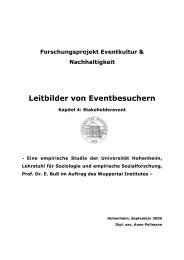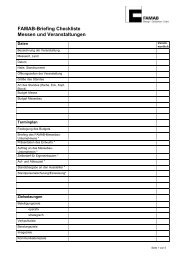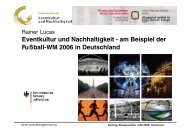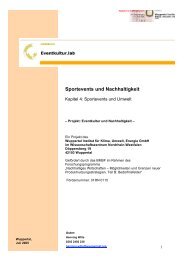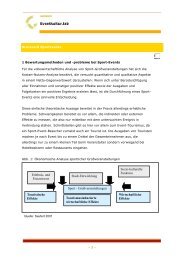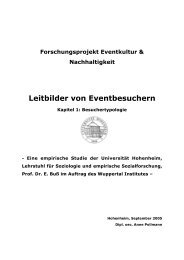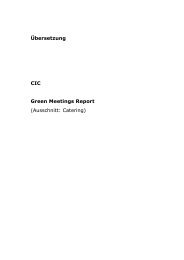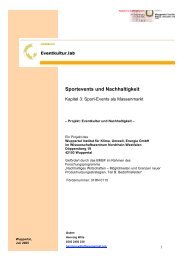environmental management and monitoring for ... - Eventkultur.lab
environmental management and monitoring for ... - Eventkultur.lab
environmental management and monitoring for ... - Eventkultur.lab
You also want an ePaper? Increase the reach of your titles
YUMPU automatically turns print PDFs into web optimized ePapers that Google loves.
• provision of cycle ways <strong>and</strong> pedestrian walk ways linked to public<br />
transport interchanges<br />
• passive solar building design wherever appropriate<br />
• selection of materials <strong>for</strong> thermal per<strong>for</strong>mance<br />
• use of insulation <strong>and</strong> natural ventilation<br />
• the widest possible use of renewable sources of energy<br />
• high efficiency lighting systems with maximised use of natural light<br />
• use of energy efficient appliances<br />
• use of recycled <strong>and</strong> recyc<strong>lab</strong>le building materials<br />
• use of building <strong>management</strong> <strong>and</strong> control systems to minimise energy<br />
requirements<br />
• zoning of mechanical ventilation to allow ventilation flow to be switched<br />
off when spaces are unoccupied<br />
C. Water Conservation<br />
Sydney is committed to:<br />
• encouragement of sound sustainable water resource <strong>management</strong> through<br />
public <strong>and</strong> industry education programs<br />
• water conservation <strong>and</strong> recycling practices<br />
• introduction of pricing policies that reflect the real cost of supplying water<br />
• recycling of treated storm water <strong>and</strong> sewage effluent<br />
• l<strong>and</strong>scape design that decreases water requirements by emphasis on<br />
selection of plants appropriate to climate<br />
• use of water conservation devices such as dual flush toilet systems, rooffed<br />
water tanks, water-saving shower roses, <strong>and</strong> appropriate irrigation<br />
devices<br />
• selection of low-water use appliances including dishwashers & washing<br />
machines<br />
• building <strong>and</strong> infrastructure design to collect waste water <strong>for</strong> recycling<br />
• protecting the usability of recycled water by minimising the use of<br />
pesticides in l<strong>and</strong>scape maintenance<br />
• use of artificial wetl<strong>and</strong>s or other appropriate methods to remove<br />
pollutants from waste water prior to recycling<br />
D. Waste Avoidance <strong>and</strong> Minimisation<br />
Sydney is committed to:<br />
• best practice waste reduction <strong>and</strong> avoidance, with per<strong>for</strong>mance criteria to<br />
apply to services, materials <strong>and</strong> appliances<br />
• the co-operation of sponsors <strong>and</strong> service providers in developing<br />
responsible corporate purchasing <strong>and</strong> waste <strong>management</strong> policies<br />
Managing <strong>and</strong> Monitoring Environmental Per<strong>for</strong>mance of Sports Events <strong>and</strong> Facilities 49


